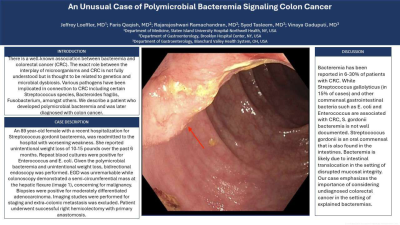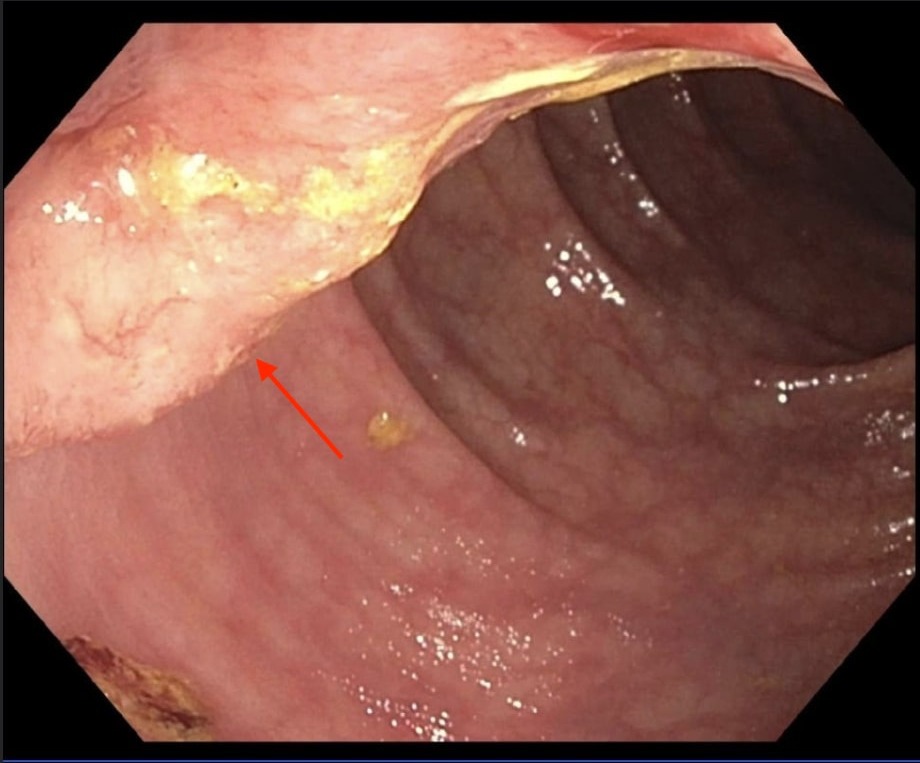Tuesday Poster Session
Category: Colon
P3701 - An Unusual Case of Polymicrobial Bacteremia Signaling Colon Cancer
Tuesday, October 29, 2024
10:30 AM - 4:00 PM ET
Location: Exhibit Hall E

- JL
Jeffrey Loeffler, MD
Staten Island University Hospital
Staten Island, NY
Presenting Author(s)
Jeffrey Loeffler, MD1, Faris Qaqish, MD2, Rajarajeshwari Ramachandran, MD3, Syed Tasleem, MD4, Vinaya Gaduputi, MD4
1Staten Island University Hospital, Staten Island, NY; 2Staten Island University Hospital, Northwell Health, Staten Island, NY; 3Fresno Veterans Affairs Medical Center, Fresno, CA; 4Blanchard Valley Health System, Findlay, OH
Introduction: There is a well-known association between bacteremia and colorectal cancer (CRC). The exact role between the interplay of microorganisms and CRC is not fully understood but is thought to be related to genetics and microbial dysbiosis. Various pathogens have been implicated in connection to CRC including certain Streptococcus species, Bacteroides fragilis, Fusobacterium, amongst others. We describe a patient who developed polymicrobial bacteremia and was later diagnosed with colon cancer.
Case Description/Methods: An 89 year-old female with a recent hospitalization for Streptococcus gordonii bacteremia, was readmitted to the hospital with worsening weakness. She reported unintentional weight loss of 10-15 pounds over the past 6 months. Repeat blood cultures were positive for Enterococcus and E. coli. Given the polymicrobial bacteremia and unintentional weight loss, bidirectional endoscopy was performed. EGD was unremarkable while colonoscopy demonstrated a semi-circumferential mass at the hepatic flexure (image 1), concerning for malignancy. Biopsies were positive for moderately differentiated adenocarcinoma. Imaging studies were performed for staging and extra-colonic metastasis was excluded. Patient underwent successful right hemicolectomy with primary anastomosis.
Discussion: Bacteremia has been reported in 6-30% patients with CRC. While Streptococcus gallolyticus (in 15% of cases), other commensal gastrointestinal bacteria such as E coli and Enterococcus are associated with CRC, S. gordonii bacteremia is not well documented. Streptococcus gordonii is an oral commensal that is also found in the intestines. Bacteremia is likely due to intestinal translocation in the setting of disrupted mucosal integrity. Our case emphasizes the importance of considering undiagnosed colorectal cancer in the setting of explained bacteremias.

Disclosures:
Jeffrey Loeffler, MD1, Faris Qaqish, MD2, Rajarajeshwari Ramachandran, MD3, Syed Tasleem, MD4, Vinaya Gaduputi, MD4. P3701 - An Unusual Case of Polymicrobial Bacteremia Signaling Colon Cancer, ACG 2024 Annual Scientific Meeting Abstracts. Philadelphia, PA: American College of Gastroenterology.
1Staten Island University Hospital, Staten Island, NY; 2Staten Island University Hospital, Northwell Health, Staten Island, NY; 3Fresno Veterans Affairs Medical Center, Fresno, CA; 4Blanchard Valley Health System, Findlay, OH
Introduction: There is a well-known association between bacteremia and colorectal cancer (CRC). The exact role between the interplay of microorganisms and CRC is not fully understood but is thought to be related to genetics and microbial dysbiosis. Various pathogens have been implicated in connection to CRC including certain Streptococcus species, Bacteroides fragilis, Fusobacterium, amongst others. We describe a patient who developed polymicrobial bacteremia and was later diagnosed with colon cancer.
Case Description/Methods: An 89 year-old female with a recent hospitalization for Streptococcus gordonii bacteremia, was readmitted to the hospital with worsening weakness. She reported unintentional weight loss of 10-15 pounds over the past 6 months. Repeat blood cultures were positive for Enterococcus and E. coli. Given the polymicrobial bacteremia and unintentional weight loss, bidirectional endoscopy was performed. EGD was unremarkable while colonoscopy demonstrated a semi-circumferential mass at the hepatic flexure (image 1), concerning for malignancy. Biopsies were positive for moderately differentiated adenocarcinoma. Imaging studies were performed for staging and extra-colonic metastasis was excluded. Patient underwent successful right hemicolectomy with primary anastomosis.
Discussion: Bacteremia has been reported in 6-30% patients with CRC. While Streptococcus gallolyticus (in 15% of cases), other commensal gastrointestinal bacteria such as E coli and Enterococcus are associated with CRC, S. gordonii bacteremia is not well documented. Streptococcus gordonii is an oral commensal that is also found in the intestines. Bacteremia is likely due to intestinal translocation in the setting of disrupted mucosal integrity. Our case emphasizes the importance of considering undiagnosed colorectal cancer in the setting of explained bacteremias.

Figure: Image 1: semi-circumferential mass at the hepatic flexure (red arrow)
Disclosures:
Jeffrey Loeffler indicated no relevant financial relationships.
Faris Qaqish indicated no relevant financial relationships.
Rajarajeshwari Ramachandran indicated no relevant financial relationships.
Syed Tasleem indicated no relevant financial relationships.
Vinaya Gaduputi indicated no relevant financial relationships.
Jeffrey Loeffler, MD1, Faris Qaqish, MD2, Rajarajeshwari Ramachandran, MD3, Syed Tasleem, MD4, Vinaya Gaduputi, MD4. P3701 - An Unusual Case of Polymicrobial Bacteremia Signaling Colon Cancer, ACG 2024 Annual Scientific Meeting Abstracts. Philadelphia, PA: American College of Gastroenterology.
